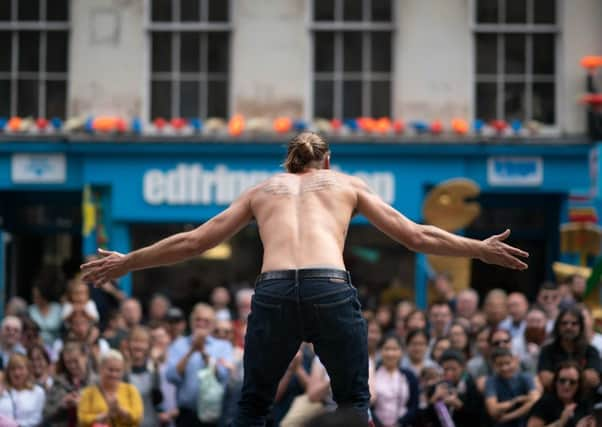Survey of Edinburgh residents finds dwindling levels of support for festivals


But with an estimated 4.7 million people flocking to cultural events in Edinburgh it seems residents may be falling out of love with them. Public satisfaction with the festivals is on a dramatic slide, according to research for the city council.
A survey of 5,000 residents has found dwindling levels of contentment with the impact of the festivals on the city and the quality of life of its people.
Advertisement
Hide AdThis is despite growing local participation in the festivals over the last five years, with two thirds of residents now attending events.
Research carried out in the months following last year’s summer festivals found just 72 per cent of people in the city felt they made Edinburgh a better place to live.
The figure is the lowest recorded over the last five years and has dropped six percentage points in the space of the last two years.
According to the council’s research, which involved 5,000 people across the city, retired people and the oldest respondents were the least likely to praise the festivals, followed by unemployed people. Full-time workers were the most supportive.
The same research found 66 per cent of people in the city had been to a cultural event in the previous two years – up eight percentage points on 2014 – while the number of people attending cultural events has gone up from 73 to 78 per cent over the same period.
Heritage groups, community leaders and politicians have been expressing growing concerns about the impact of the festivals on people living and working in the city centre over the same period.
Advertisement
Hide AdBut the concerns have provoked a backlash from bodies like Marketing Edinburgh amid claims that “everybody hates a tourist”had almost become the strapline of the city due to the chorus of complaining.
City council leader Adam McVey had to intervene to defuse a furious row last August over barriers blocking views of Edinburgh Castle that were installed on Princes Street to accommodate concerts at the Ross Bandstand.
Advertisement
Hide AdOrganisers of a new community-led campaign launched earlier this year to “defend” Edinburgh against over-tourism, gentrification, property developers and the privatisation of public space in the city raised specific concerns about the impact of the “festivalisation” of the city and a “rampant growth model” it claimed was guiding council policies.
When the Fringe Society unveiled its biggest ever official programme last week – with almost double the number of performances it had a decade ago – chief executive Shona McCarthy (inset) warned Edinburgh was “seriously in danger” of being seen as “anti-tourist”.
McCarthy said the city had to be “very careful” about how it was perceived and stressed the importance of Edinburgh remaining “international and outward-looking” in future, adding: “The idea that a three-week festival has to take on the responsibility for things that are year-long issues and that the Fringe is responsible for over-tourism in Edinburgh is a bit weird for me. It is about better management of tourism rather than having an anti-tourism agenda.
“We don’t have a growth agenda, but it’s important to point out our biggest audience growth is in Edinburgh and Scotland.”
A spokeswoman for the city council said: “For the majority of residents and visitors, our festivals are part of what makes Edinburgh such a special place to live. We have a cultural scene to be proud of and we continue to work to ensure that everyone has access to world class cultural provision.
“It is great to see increasing numbers of Edinburgh residents attending festivals and a majority believe they make the capital a better place to live.
Advertisement
Hide Ad“Whilst we’re proud of our world-class status and our city’s ever-growing popularity, we must also recognise and address the pressure on our core services and on the people who live and work here.
“It’s important to note that 72 per cent of those asked said festivals made life better and seven per cent said worse.”